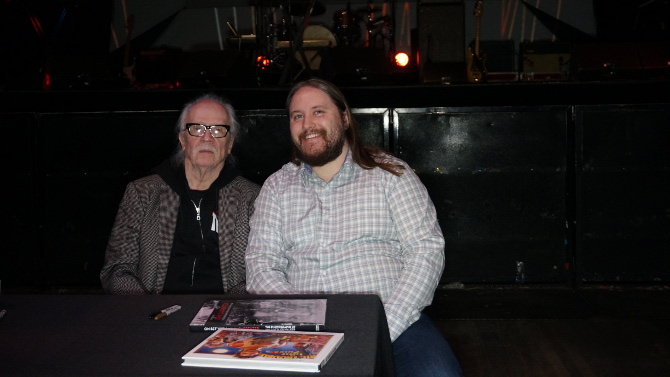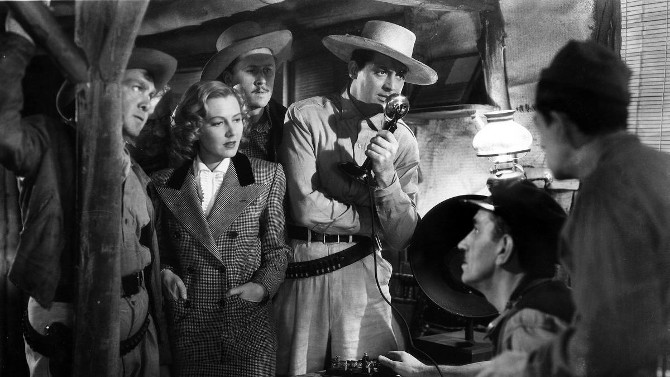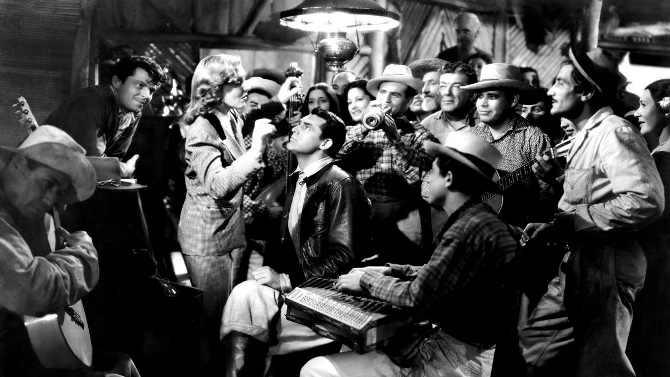What is there to say about an icon like John Carpenter? An auteur with the skill to make dynamic features with a minuscule budget, his film Halloween majorly influenced the slasher sub-genre (along with gialli, and other movies such as Peeping Tom, Psycho, The Texas Chainsaw Massacre and Black Christmas).
One of the most prolific horror filmmakers since the 1970s, he followed up the October 31st related motion picture with titles like The Fog, The Thing, Christine, They Live, amongst many others, whilst he has branched out into other genres with films like Assault on Precinct 13 (action), Escape From New York and its sequel Escape From L.A. (sci-fi action), Starman (a sci-fi romance), and Big Trouble in Little China (an action adventure comedy).
More impressively, he not only writes his own stories/screenplays, but also composes the scores for his films as well (of course, there are rare exceptions – The Thing was neither written nor composed by him). His music from Halloween, for instance, usually finds itself listed at number one (or close to it) on most experts’ lists when it comes to the greatest horror scores of all-time.
I must say that I was more than fortunate to meet the tour de force filmmaker on November 13th, 2017 – now on the road as a rock star, touring with his band (including son Cody and godson Daniel Davies – son of The Kinks’ Dave Davies) performing his legendary scores as well as a plethora of songs that he refers to as ‘the soundtrack of our minds’ – music for movies that can only be found in our imagination.
The always busy man was gracious enough to take the time to pass along his favourite film to me, promptly citing Howard Hawks’ dynamic 1939 feature Only Angels Have Wings as his all-time number one. With Hawks having had a major influence on the writer/director’s career, he had only superlative things to say about Hawks (loving his genre jumping films – be it western, drama or horror) and the picture (its vision, direction, lighting, characterization and other such things).
Set in the exotic port city of Barranca, it is a place that is alive with energy. Nestled amongst the Andes mountains, Bonnie Lee (Jean Arthur), a piano-playing chorus girl, disembarks a ship that has just docked. . . looking to enjoy the majestic foreign locale until she departs the next morning. After meandering through the busy streets and popping her head into a dance/music-centric nightclub, she bumps into two Americans, one of which, Joe Souther (Noah Beery Jr.), invites her for dinner.
It is this fateful meeting that brings her into the world of a small airway delivery company (which Souther works for), a group of brave, maverick pilots who, for all of their camaraderie, risk their lives for the job each and every day – thriving in the moment, it is quite evident that terms like past and future play almost no role in the way they live. Owned by meek Dutchy (Sig Ruman), the airway is managed and run by Geoff Carter (Cary Grant), a cold, callous business-driven man who shows almost no emotion.
Due to its very unique geography (mountains and water), the port is often covered in pea-soup thick fog, and is frequently hit by intense weather. Carter calls upon Souther to work, making him lose out on his dinner with the dame. . . but when the fog gets too bad, he is called back. . . yet, instead of entering a holding pattern until the fog somewhat clears, his live-in-the-moment outlook finds him trying to land so that he can continue his date. He crashes, dying on impact.
In what seems like it would be a moment of pain and tears, the men of the airway continue to live it up, no time for funerals or other farewells – their only tradition is to give fellow employees the opportunity to pick out one of the dead man’s items rescued from the crashed plane. At first, Bonnie is frustratingly stupefied by their cavalier attitude, though she soon accepts their unusual customs, joining them for a rousing song – in which she plays the piano.
Soon, the woman, constantly at odds with Carter, is falling for him – though he claims that he would “never ask any woman to do anything”. Yet, as the job decrees, Carter gets the news that the fog is clearing and he is off – things move pretty fast in Barranca. The Kid (Thomas Mitchell), a man who has been flying twenty-two years (and is Carter’s mentor), tells her, “well lady, you’re really better off this way”. At first in a stupor, she answers, “sure, I guess. . . Now wait, I hardly know the man”, to which he replies, “sure, but you’ll get over it”.
Despite his advice, Bonnie decides to stay, surprising Carter upon his return. Somewhat exasperated, the push and pull relationship continues. Further complicating things, the new pilot that comes in on the next ship, Bat MacPherson (Richard Barthelmess), is using a pseudonym and is actually the pilot who ‘jumped ship’ mid flight, killing Kid’s brother, a mechanic. And, hold on to your hats, in walks his wife, and there has never been a woman like Judy (Rita Hayworth) – Carter’s former gal, it is she who has partially made him this way.
It is eventually revealed that the company is in dire straights, the reason why Carter has been pushing everyone so hard is that they must complete every run within a six month period to get a new contract that will save the business. Will the ragtag team, low on pilots and now divided by Bat’s arrival, be able to pull together and save the company?
Like other truly great films, Only Angels Have Wings has what I like to term ‘unpredictable inevitability’, a movie that draws first time viewers in, keeping them on their toes – unsure of what will happen and how it will end. Yet, when the credits role, you look back and it seems as if that was the only ending possible – as if fate itself had predestined the movie to follow this perfectly plotted path (three other examples: Casablanca, Gilda, and In Bruges). It is a motion picture of moments, one after another, each scene, be it big or small, leaving an impact, furthering character development, expanding the story. Just a few standout sequences worth watching for: a moment when Carter must ground one of his pilots due to worsening eyes (a plane engine starts in the distance, as if teasing the depressed man); MacPherson’s chance at reconciliation; an emotional death scene, and the closing sequence.
Similar to a stage play (in that it is mostly set in Dutchy’s establishment), the personas and dialogue are of the utmost importance, each phrase key to the piece, elevated by the superlative cast. A personal favourite of mine – after another loyal friend has died on the job, Carter is asked by another as to how the man is doing, beautifully explaining that he “took off a few minutes ago”. The fusion of acting and dialogue are transcendent, as if these people could walk out of the screen and into your livingroom – they each have idiosyncrasies (like the Kid always flipping his lucky coin) and have the ability to change, even if only a little – whether they will or not, is part of the rivetting reality that is humanity. Much like Bonnie, by the end of the picture, we too do not want to leave this special place.
Set almost always at night, the movie’s lighting draws similarities to the film noirs that would soon be littering theatres (with 1941’s The Maltese Falcon often considered the first noir) – shadow etching every visage, shaded bars entrapping the characters, lamp lit rooms littering the half-tipsy dancers, singers and partiers, dramatic mood filtered within every frame. It is as if the light was reminding the viewer of the danger that lurks at a moment’s notice. . . not psychopaths or murderers, but rather, the clash of man versus nature. They all know the darkness is there, and that there is no fighting it (the themes of friendship, unity and death only heightened with the film being released the same year as the start of World War II) – a message passed along by Carter to Bonnie when she blames herself for the pilot’s death, “sure it was your fault. You were gonna have dinner with him, the Dutchman hired him, I set him up on schedule, the fog came in, a tree got in the way. All your fault. Forget it, unless you want the honor.” – once again, reiterating their belief in fate and living in the moment. Even in scenes shot during the day, there are reasons for the darkness – eye tests and such, that further deepen the atmosphere.
A tale of male friendship (fights, forgiveness and unity) set against the backdrop of a more than dangerous job, Only Angels Have Wings soars on Hawks’ back, the filmmaker aptly able to fuse adventure, comedy, romance, drama and thrills in one perfectly packaged tale. Perhaps it works so well due to it being based upon multiple true stories (Hawks based the story upon a man and woman he met in a similar location, while many of the harrowing in-air sequences were also based upon other people he knew. . . according to the director, everything actually happened somewhere along the line). The flying scenes are also worth noting, though some of them are obvious models, many of them are actually shot in-air (some of the most impressive being when MacPherson goes on his first, almost impossible job). Lastly, many have impersonated Cary Grant over the years by uttering the famous line, “Judy, Judy, Judy”, even though he never repeats the name in succession in the film – despite Hayworth’s character being named so. Though no one truly knows the truth, two theories are that it is just one of those misquoted lines that have entered the collective psyche, while the other, suggested by Grant, is that celebrity impersonator Larry Storch greeted Judy Garland that way as she entered one of his shows – how it caught fire from there, who knows?. . . in any case, it is still the go-to line for those attempting to capture the icon’s unique diction. So, create your own fate and see this classic motion picture, it was ahead of its time.



